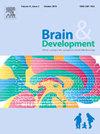Parent-child interaction therapy as a therapeutic approach for children with autism spectrum disorder in Japan
IF 1.3
4区 医学
Q4 CLINICAL NEUROLOGY
引用次数: 0
Abstract
Background
Children with autism spectrum disorder (ASD) often face difficulties in parent-child relationships and exhibit problematic behaviors. This study retrospectively examines the effects of standard Parent-Child Interaction Therapy (PCIT) for children with ASD and their caregivers in Japan, focusing on reducing parental stress and children's problematic behaviors.
Methods
Eight parent-child dyads with children aged 2.5–7 years with ASD underwent standard PCIT. Measures included the Eyberg Child Behavior Inventory (ECBI), Beck Depression Inventory-II (BDI-II), Parenting Stress Index-Short Form (PSI-SF), and Child Behavior Checklist for Ages 4–18 (CBCL/4–18), assessed pre- and post-treatments.
Results
For parents, ECBI problem score decreased from 16.8 (SD ± 4.4) to 3.0 (SD ± 4.1) pre- and post-treatment (p < 0.05, effect size 1.9). PSI-SF parent section scores dropped from 28.7 (SD ± 7.1) to 22.1 (SD ± 6.2) (p < 0.01, effect size 2.0). The total PSI-SF score from 58.1 (SD ± 10.9) to 45.0 (SD ± 11.1), (p < 0.01, effect size 1.7). For children, ECBI intensity scores decreased from 147.9 (SD ± 20.3) to 85.5 (SD ± 17.7) (p < 0.01, effect size 3.4). PSI-SF child section scores fell from 29.4 (SD ± 4.8) to 22.9 (SD ± 5.8) (p < 0.05, effect size of 1.2), and total CBCL from 70.3 (SD ± 5.9) to 62.0 (SD ± 8.4) (p < 0.05, effect size of 1.5).
Conclusion
The standard PCIT for children with ASD and their parents in Japan significantly reduces parental stress and children's problematic behaviors, improving parent-child interactions.
亲子互动疗法对日本自闭症谱系障碍儿童的治疗效果。
背景:自闭症谱系障碍(ASD)儿童在亲子关系中经常面临困难,并表现出问题行为。本研究回顾性研究了标准亲子互动疗法(PCIT)对日本自闭症儿童及其照顾者的影响,重点是减少父母的压力和儿童的问题行为。方法:8对2.5 ~ 7岁ASD患儿进行标准PCIT治疗。测量方法包括Eyberg儿童行为量表(ECBI)、Beck抑郁量表- ii (BDI-II)、父母压力指数简表(PSI-SF)和4-18岁儿童行为检查表(CBCL/4-18),对治疗前后进行评估。结果:家长的ECBI问题评分从治疗前后的16.8 (SD±4.4)降至3.0 (SD±4.1)(p)。结论:日本ASD儿童及其家长的标准PCIT显著降低了父母的压力和儿童的问题行为,改善了亲子互动。
本文章由计算机程序翻译,如有差异,请以英文原文为准。
求助全文
约1分钟内获得全文
求助全文
来源期刊

Brain & Development
医学-临床神经学
CiteScore
3.60
自引率
0.00%
发文量
153
审稿时长
50 days
期刊介绍:
Brain and Development (ISSN 0387-7604) is the Official Journal of the Japanese Society of Child Neurology, and is aimed to promote clinical child neurology and developmental neuroscience.
The journal is devoted to publishing Review Articles, Full Length Original Papers, Case Reports and Letters to the Editor in the field of Child Neurology and related sciences. Proceedings of meetings, and professional announcements will be published at the Editor''s discretion. Letters concerning articles published in Brain and Development and other relevant issues are also welcome.
 求助内容:
求助内容: 应助结果提醒方式:
应助结果提醒方式:


